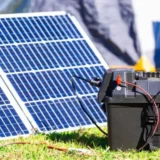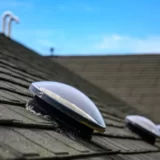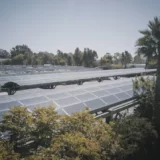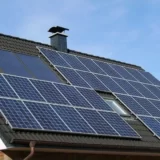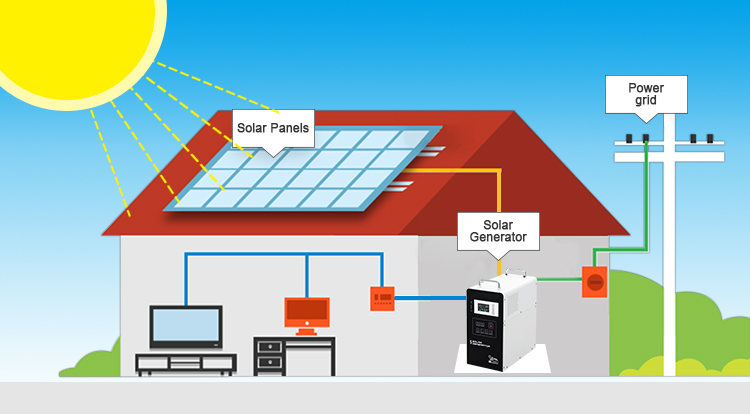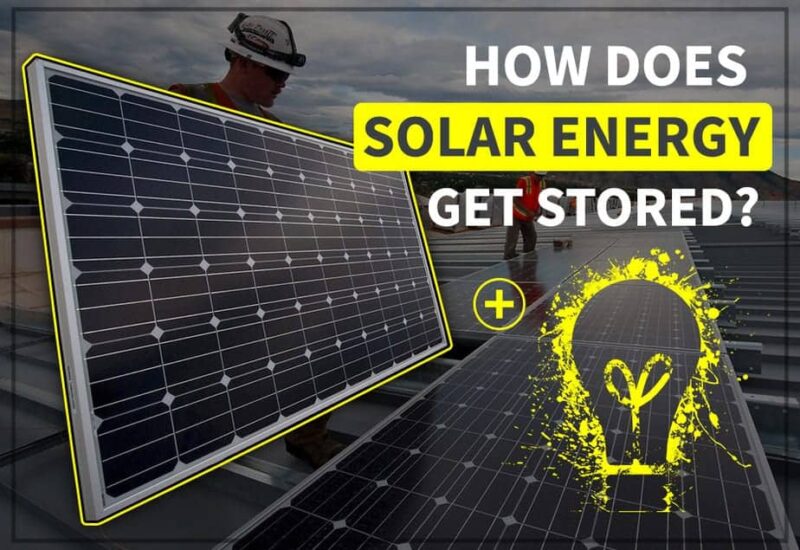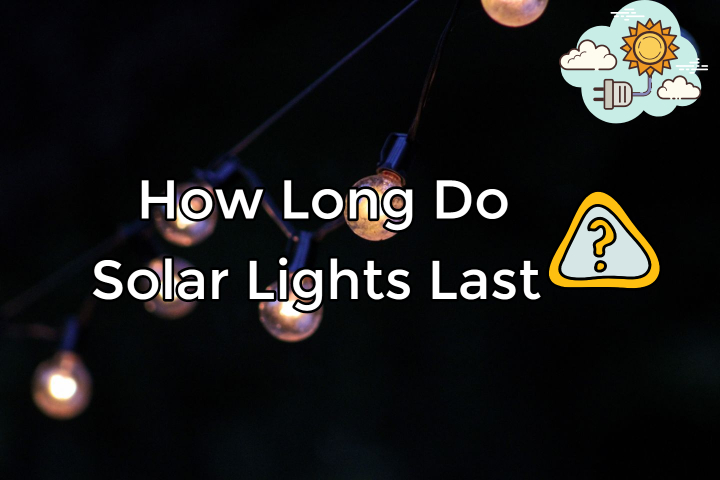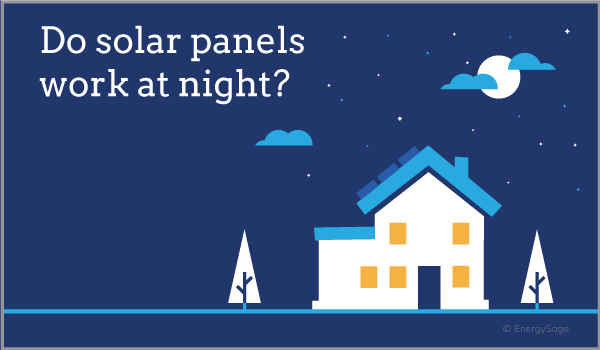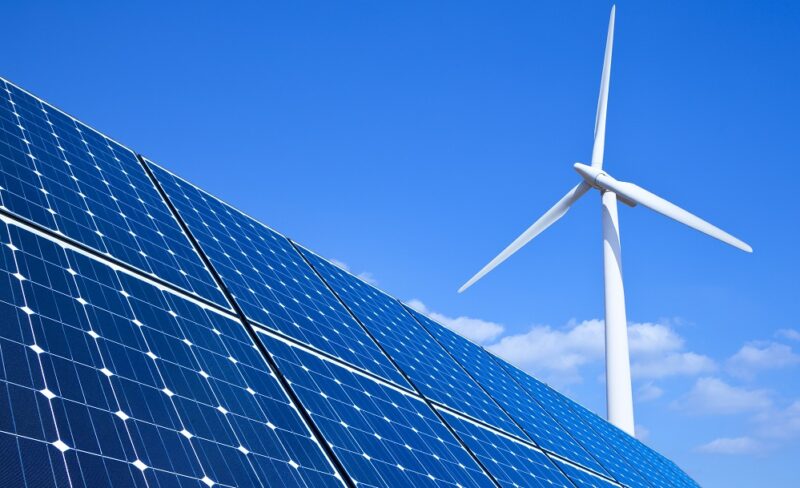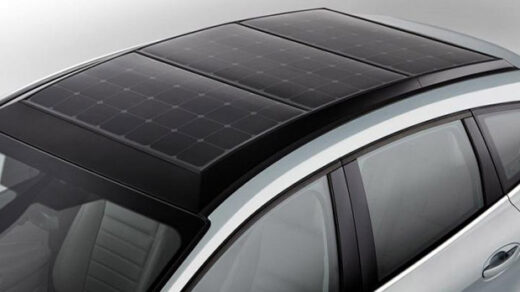Consider a flexible solar panel if you’re thinking about installing solar energy for your trailer, camper, or RV. They are a little more accommodating than rigid solar panels and perfect for RV living!
Flexible solar panels can bend without losing their functionality because they are made with silicon layers that are over 300 times smaller than those of conventional solar panels.
The following outlines what to look for in the best flexible solar panels, and my top choices on the market today!
Table of Contents
Best Flexible Solar Panels: Top Picks
- 1. Renogy 100 Watt 12 Volt Flexible Monocrystalline Solar Panel
- 2. Renogy Solar Panel 100W 12V Lightweight Semi Flexible
- 3. Renogy 175 Watt 12 Volt Flexible Monocrystalline Solar Panel
- 4. Topsolar 100W Flexible Solar Pane
- 5. SunPower 110 Watt Flexible Solar Panel
- 6. Topsolar Flexible Solar Panel 100W 24V/12V Monocrystalline Bendable
- 7. SunPower 50 Watt Flexible Solar Panel
- 8. Newpowa 100W 100 Watts Semi-Flex Solar Panel
- 9. RICHSOLAR 80 WATT CIGS Flexible Solar Panel
- 10. HQST 100W 12V Monocrystalline Flexible Solar Panel
- 11. BAINTECH 110W Slimline Flexible Solar Panel
The Best Flexible Solar Panels
1. Renogy 100 Watt 12 Volt Flexible Monocrystalline Solar Panel

I’ve chosen this small monocrystalline solar panel to build a DIY solar generator kit after realizing how durable and adaptable it is.
Whether you have a boat or RV, this flexible powerhouse is only 1/10″ thick and fits seamlessly on every surface like a rug. It is still functional even when bent up to 248 degrees.
Additionally waterproof and incredibly robust, Renogy 100 Watt. In snow and rain, I’ve had no problems with it.
I frequently have to clean up branches and bird droppings at the end of my trips, but the flexible panel is never visibly harmed.
This panel’s durability can be attributed to a unique lamination material that gives it a thin but enduring anti-scratch layer. High transparency and best solar conversion are both correlated with no scratches.
Pros
- Great for vehicle tops
- High efficiency of conversion
- Super flexible25-year power output warrantyIP68 water resistant
Cons
- Brief instructions
2. Renogy Solar Panel 100w 12v Lightweight Semi Flexible
This lightweight solar panel easily produces 500 watt-hours of electricity each day, despite not being as flexible as its acrobat cousins.
The fact that these flexible solar panels for boats weigh half as much as the fully flexible 100W model is also good news.
You can therefore pack two items for the same weight.
These flexible solar panels may appear straightforward, but they are filled with cutting-edge technologies. Due to the solar cells’ use of half-cut technology, the panel can generate more power while remaining the same size.
Considering that panels may unintentionally be shaded by tree canopies or boat sails, this is particularly crucial for outdoor and marine use.
Additionally, a diode circuit prevents reverse current flow from the battery to the panels when there is no sun exposure, shortening the life of the panels.
Pros
- Great for vehicle tops
- High efficiency of conversion
- 25-year power output warranty
- IP68 water-resistant
Cons
- Controller adaptor kit not included
- Brief instructions
3. Renogy 175 Watt 12 Volt Flexible Monocrystalline Solar Panel
Renogy 175 Watt is unquestionably the best adaptable solar panel on the list, along with its smaller sibling.
If I need a bit more power, I switch to a pair of these monocrystalline solar modules. Despite being a bit larger than the majority of the panels I’m reviewing here, they fit comfortably on the RV roof.
Even on cloudy days, these Renogy flexible solar panels perform exceptionally well in my usage.
The 42000 mAh portable battery in my van was fully charged after I tried charging through the windshield and returned from work.
Renogy 175 Watt is perfect for marine use because it has a junction box and a solar connector that can withstand water.
Just remember to mount them using silicone adhesive on the backside; grommets are only for stationary uses.
Pros
- Super flexible
- 25-year power output warranty
- US-based company
- IP68 water-resistant
Cons
- Positive cables are short
4. Topsolar 100w Flexible Solar Pane

These solar panels practically disappear on your RV roof thanks to their thin 0.1 inch thickness.
Topsolar Flexible Panels, which can be bent to a minimum arc radius of 16 inches, are a great option for boats, teardrop trailers, and all curving surfaces.
After reading some unfavorable user reviews regarding output voltage and amperage, I made the decision to research this product on my own.
Testing helped to identify the problem: the output is greatly influenced by the controller type you employ. You can do everything you need to if you purchase a good MPPT (Multiple Power Point Tracker) controller.
It really helps to charge a battery in cloudy conditions when a controller like this converts excess voltage into more amperage for the battery.
In contrast to Renogy, these flexible solar panels for car roofs feel a little more brittle, so I wouldn’t try mounting them for tents and portable canopies.
Pros
- Super flexible
- Only 1/10″ thick
- Anti-scratch coating
- Water-resistant
Cons
- Not for tents and canopies
5. Sunpower 110 Watt Flexible Solar Panel

Please do not discount SunPower products because of a cosmetic flaw on the solar panel surface. We can overlook a few flaws because they are made to be affordable but dependable.
This SunPower flexible solar panel is a compact, strong, ultralight panel that can be bent up to 30 degrees and is simple to fold for storage.
My system delivered anywhere between 50 and 100 watts, depending on the amount of sunlight available. But even in the shade, it provided me with enough juice to run my 12V refrigerator.
The drawback is that you might want to look elsewhere if you’re looking for a monocrystalline solar panel for your saltwater boat. The use of saltwater is not covered by the warranty on this one.
I also hope SunPower will make connectors that are simpler to disconnect. Release tabs cannot be pushed down without a small screwdriver.
Pros
- Lightweight
- Easy to store away
- Folds up to 30 degrees
- Inexpensive
Cons
- Needs tools to disconnect
- Not for marine use
6. Topsolar Flexible Solar Panel 100W 24V/12V Monocrystalline Bendable

Solar technology is developing quickly. Flexible solar panels for RVs are best affordable and offer solutions that were previously only available with the highest-quality rooftop panels.
Solar cells from Topsolar that use back-contact technology and don’t have electrodes on the surface are used in these semi-flexible panels.
The conversion efficiency is now 50% higher than panels with exposed electrodes thanks to this engineering trick.
My 12V battery and a single panel are perfect for each other. Multiple panels can be connected in series with ease if you use a 24V battery. For the best results, just keep in mind to use a quality controller.
With these panels, I regrettably discovered the hard way that flexible doesn’t equal portable. In no way are they intended to be mounted and removed frequently. For these, only fixed installations are acceptable.
Pros
- Very flexible
- Only 1/10″ thick
- Anti-scratch coating
- Water-resistant
Cons
- Needs high-end controller
- Not for mobile uses
7. Sunpower 50-Watt Flexible Solar Panel

I was immediately drawn to these flexible solar panels because of how little space the unit took up. This makes it simple to use these SunPower flexible solar panels with angled surfaces on boats and RVs.
If you can’t fit one 40×20″ panel, you can mount two 20×20″ ones, and take your boar off-grid, even if you don’t leave the marina at all.
I hope that with regular use, the panel will last for many years. It feels sturdy. These panels are ideal for camping and road trips because of their size.
I am unable to award this panel more stars, however, because of the 50W rating. Simple math shows that a 100W panel will double the speed at which your battery recharges.
Pros
- Very flexible
- Compact size
- PV4-S connectors included
- Water-resistant
Cons
- Only 50 Watts
- Comes in flimsy packaging
8. Newpowa 100W 100 Watts Semi-flex Solar Panel

The lightweight design of another flexible solar panel makes it one of the best option for use on the roofs of moving vehicles.
For flexible solar panels in the 100-watt range, Newpowa is one of Amazon’s top sellers.
However, there isn’t much information available about these besides the basic manufacturer datasheet, so I wasn’t sure what to anticipate.
The fact that the packaging quality is comparable to Renogy panels pleasantly surprised me. Additionally, all the cables are already attached, making it simple for you to correctly install the panel.
You get six mounting holes along the edges, which is standard for a panel this size.
The panels, like Renogy 100W, are said by the manufacturer to be capable of up to 248 bends. I just don’t see how this is feasible in real life. 40 degrees is the best I can manage because the panel feels much more rigid.
Pros
- Pre-attached connectors
- Compact size
- Water-resistant
- Very thin
Cons
- Not bendable as advertised
- No reverse current protection
9. Richsolar 80 Watt Cigs Flexible Solar Panel

You’ve arrived at the ideal location if flexibility is what you’re seeking. Other solar panels on this list cannot be fully rolled up without suffering long-term damage.
The amorphous silicon thin-film technology used by RichSolar 80 Watt can be easily bent to fit any type of surface.
The panel is primarily made of polymers, making it incredibly tough and highly resistant to vibration and fire. It can even withstand some foot traffic.
The only criticism I have of these panels is that they aren’t the option that is best for weather resistance. There are harsh winters and scorching summers where I live, and after two years of intensive outdoor use, I can already see some delamination. Like the day I bought it, it continues to function.
Pros
- Very flexible
- Compact size
- Perfect for vehicles and tents
- Can be sewed
Cons
- Adhesive cover hard to peel off
- Not for extreme weather
10. Hqst 100w 12v Monocrystalline Flexible Solar Panel
For those who want to start stepping away from the grid, this monocrystalline solar panel from HQST is a fantastic choice.
Connect two of them to create a 24V system or use them with a 12V battery.
Although not the most adaptable solar option available, monocrystalline technology makes it surprisingly durable.
Durable PET serves as the panel’s backside, the cell layer is sandwiched between two sheets of EVA, and the business side is covered in anti-scratch film.
Only the packaging is something I don’t like. Styrofoam was missing from the box in which mine arrived, protecting the panel’s face. Though your results may vary, HQST and Amazon ought to investigate this.
Pros
- Reinforced layers
- Compact size
- Water and dust resistant
- Very thin
Cons
- Uses Renogy leads for the junction box
- Comes in poor packaging
11. Baintech 110W Slimline Flexible Solar Panel
It checks all the boxes, which is why this Flexi panel is our TOP PICK! It is inexpensive, lightweight, and equipped with SunPower cells.
This 110W Flexible Solar Panel is powered by the best efficient SUNPOWER Monocrystalline technology and performs well even in cloudy conditions.
Since it has a lightweight aerodynamic design in place of heavy and bulky glass sections, the 110ah Baintech Flexi solar panel range is perfect for all vehicles.
Pros
- Waterproof
- ETFE coating and adhesive 3M backing for easy install
- Lightweight,
- Durable
Cons
- None
What Are Flexible Solar Panels?
The term “flexible solar panel” refers to solar modules that are bendable and portable and can be used in outdoor settings, on boats, RVs, cars, and off-grid cabins.
They are portable and versatile, making it simple for you to transport and use them wherever you are. Even some thin-film solar panels can be folded and rolled.
This type of solar panel is more resilient than standard ones thanks to its flexibility, and its curved surface improves performance in low light.
As they must operate off-grid in a variety of environments, including rain, snow, and dust, as well as withstand abrupt changes in temperature, durability is crucial.
Cost Of Flexible Solar Panels
The cost of flexible solar panels varies according to factors like size, brand name, brand quality, efficiency, durability, materials, capacity, and features. Flexible solar panel options are available for any on-the-go need and budget, with prices ranging from $150 for a single 100-watt panel up to $1,000 or more for multiple panel units.
Even though purchasing the best solar panels available isn’t absolutely necessary, we don’t suggest relying on any old, subpar model you find on Amazon to supply your off-grid power.
Flexible Solar Panels Vs. Traditional Panels
Surprise, surprise—the flexibility of the panels is their primary distinction from conventional rigid panels.
Wide-ranging applications are possible for flexible solar panels. Flexible panels can be installed in a variety of ways, including on uneven surfaces. They are therefore excellent for campers and recreational vehicles.
Additionally, flexible panels are inexpensive, portable, lightweight, and strong!
Additionally, because they are semi-transparent, they can be installed on glass or used as windows.
There are some drawbacks to flexible solar panels in addition to their many advantages. Traditional solar panels are more effective than their flexible counterparts. Solar panels without a curved surface are less effective at converting sunlight into solar energy.
Additionally, flexible solar panels occupy a little bit more space than do traditional solar panels. That’s because more surface area must be covered by the layers of PV cells because they are not as thick. They consequently occupy more room.
These panels may also live less time than a typical panel.
Factors To Consider When Choosing A Flexible Solar Panel
You might be considering buying a flexible solar panel now that you have a better understanding of how they operate and the best models on the market. Here are some considerations to make when it comes time to purchase solar panels so you can choose the option that will best suit your budget and power requirements.
Design And Size
Determine the location where you’ll install your new flexible solar panel first. You’ll have more options if the area is bigger (like the roof of an RV, for example). You should search for more effective, high-capacity panels if the area is small or has an irregular surface.
The shape of the area you intend to install on—flat or curved—as well as the presence of any obstacles or obstructions, must also be taken into account. The good news is that flexible solar panels typically have no trouble operating on a slightly curved surface. A flexible solar panel with sufficient range of motion should be purchased if your installation area has a noticeable curve.
Wattage
More electricity can be generated under the same conditions by solar panels with higher wattages. Compare the daily output of the solar panel with the requirements of the appliances or devices you wish to power with solar energy to determine the precise number of solar panels you require.
Efficiency
Flexible panels are generally less effective than rigid ones, but they do tend to work better in dimly lit environments. To generate the same amount of energy as a more efficient panel, you’ll need more panels if you select a less efficient one. The effectiveness of solar panels is also influenced by where you live.
Durability
If you’re looking for a flexible solar panel, it’s likely that you need one that can withstand the rigors of the trail, water, or road. The majority of flexible solar panels provide excellent weatherproofing, flexibility, and thoughtful construction to withstand conditions that a rigid panel wouldn’t. Flexible solar panels are among the toughest options on the market.
Installation Process
Thankfully, installing flexible solar panels is incredibly simple. Installing your new solar system is now simpler than ever thanks to the abundance of flexible solar panels on the market that feature adhesive backing and plug-and-play components.
Cost
Choosing a flexible solar panel is frequently constrained by price. You don’t have to break the bank to find something to keep your batteries charged or to power small electronics. You can purchase an installation-ready kit for less than $250.
However, a little more power comes at a higher cost. Purchase only what you require; if your needs increase, string additional panels together or upgrade your system.
How To Clean Flexible Solar Panels?
The best flexible solar panels with a polymer top coating are essentially self-cleaning because the subsequent rain will wash away any dust and debris. However, there are instances where your panels will become soiled by bird droppings or tree sap, necessitating your own cleaning. Here’s how to do it:
- Step 1: Scan your panel for stain deposits, then try to wash them away with some fresh water. By doing this, you can get rid of the dirt, debris, and even some bird droppings that lower the performance of your portable solar panel.
- Step 2: Use neutral soap and water along with more tenacious stains and grease for best results. Useless aggressive cleaners must be avoided. Apply the soap carefully, avoiding the abrasive side, and scrub. Denatured alcohol can be used to eliminate grease as well.
- The buildup in the corners can be removed in step 3 using a soft brush. Use a pressure washer sparingly because it might harm your panels.
- Step 4: You might need to polish the panel if you allow contaminants to accumulate over time or if you notice signs of oxidation. Use either ReJex or Novus brand polish, as the latter will also erase minute scratches. Always polish the panels by hand; otherwise, too much friction from a power polish could burn the surface.
- Step 5: After your panel has been thoroughly cleaned and dried, cover it with a layer of a plastic protectorate, like Novus or Plexus Plastic Cleaner. Remember that dirty flexible solar panels can lose 20% of their power output, according to the Solar Energy Power Association. The figure is 25% according to the National Renewable Energy Laboratory.
Our Verdict
The Renogy 100 Watt 12 Volt Flexible Monocrystalline Solar Panel is a great option if you’re searching for a single flexible solar panel that will provide you with value for your money.
The outstanding conversion efficiency of this flexible panel, which allows you to use it for several more hours during the day, in my opinion, makes it the best of both crystalline and thin-film products.
Additionally, this item is weatherproof, in contrast to some others on the list that is only partially so. I’ve used it while bivouacking in the snow, using it in the rain and wind.
The Renogy 100 Watt is the best flexible solar panel to buy if you want one for your boat, RV, or to take camping.
You May Also Like: Best Solar Panels for Camping
FAQs
Are flexible solar panels any good?
Yes, modern flexible solar panels offer a great, long-lasting alternative to rigid ones. They are resilient, adaptable, and have enough power for batteries and small appliances. The only drawbacks are that they are slightly less effective than rigid panels and might not last as long.
Can Flexible Solar Panels last as long as regular solar panels?
In general, flexible solar panels are not as durable as conventional solar panels. Between 25 and 40 years are the typical lifespan of rigid panels. For 15 to 25 years, flexible panels keep working.
Can you walk on flexible solar panels?
Most pliable solar panels are suitable for walking on. For information on whether walking on your panel will void the warranty, check with your manufacturer.



